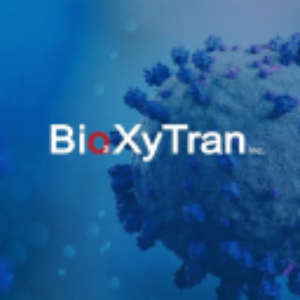Nature Reviews Drug Discovery Article Offers Independent Support for ProLectin-I in Fibrosis and ProLectin-M as an Antiviral Drug
BIOXYTRAN, INC. (OTCQB: BIXT) has announced that a peer-reviewed article published in Nature Reviews Drug Discovery supports its drug development for fibrosis and antiviral treatments. The article, titled “Targeting galectin-driven regulatory circuits in cancer and fibrosis”, highlights the significance of galectins in diseases like Idiopathic Pulmonary Fibrosis (IPF) and Long COVID. ProLectin-M, an oral drug, showed a 100% responder rate in clinical trials for COVID-19, while ProLectin-I, an intravenous drug, aims to tackle Long COVID and IPF. The ongoing studies and supportive literature enhance the prospects for regulatory approval.
- ProLectin-M achieved a 100% responder rate in clinical trials by day 7.
- ProLectin-I targets Long COVID and IPF, addressing a global health issue affecting millions.
- The publication strengthens Bioxytran's scientific foundation for its drug development programs.
- None.
Insights
Analyzing...
BOSTON, MASSACHUSETTS, Feb. 22, 2023 (GLOBE NEWSWIRE) -- BIOXYTRAN, INC. (OTCQB: BIXT) (the “Company”), a clinical stage biotechnology company developing oral and intravenous drugs to treat COVID-19, other viral diseases, and fibrosis announced today that Nature Reviews Drug Discovery journal published a peer-reviewed article that supports the rationale behind the development of ProLectin-I for fibrosis and ProLectin-M as an antiviral drug. The article published on 9 February, 2023, was titled “Targeting galectin-driven regulatory circuits in cancer and fibrosis“ was authored by Karina Marino, Alejandro Cagnoni, Diego Croci, and Gabriel Rabinovich. The review article independently supports Bioxytran’s drug development program for fibrosis and antiviral disease treatment. The theoretical basis of the drug design was inhibition of multiple galectins like those highlighted in the journal article.
https://www.nature.com/articles/s41573-023-00636-2
The article highlighted 3 out of 5 polysaccharides that Dr. David Platt invented as therapies over his 30-year career in galectins. The article concluded that galectins shared a common pro-fibrotic function and that disease conditions like NASH, Idiopathic Pulmonary Fibrosis (IPF) and malignancies could benefit from targeting galectins as well as a diverse group of other disease states implicated by heightened galectin expression. Bioxtyran developed multiple galectin antagonists and the review article independently bolstered the scientific basis of its drug development.
About ProLectin-M
ProLectin-M is an oral galectin antagonist that prevents the entry of the SARS-CoV-2 virus into human cells. In recent clinical trials the drug achieved a
About ProLectin-I
ProLectin-I is an intravenous new chemical entity drug that is expected to treat Long COVID and Idiopathic Pulmonary Fibrosis (IPF). Long COVID is estimated to have 65 – 100 million cases worldwide.1, 2 The CDC believes it affects one in five people that contract COVID-19. According to Harvard University, the economic cost of Long COVID is
The top theory behind the pathogenesis of Long Covid is viral persistence6 or viral fragments. ProLectin-I binds to the ‘galectin fold’ of the spike protein thereby neutralizing a replication competent viruses’ ability to infect other cells, but it also binds to spike protein fragments thought to be the cause of ongoing inflammation. 7
The medical term for scar tissue is fibrin. The word fibrosis stems from the continued growth of fibrin. Once scar tissue forms in the lungs combined with an already suppressed immune system, scar tissue can start to spread quickly. The reason for scar tissue forming in the lungs can vary, but it can always be associated with the onset of lung damage. Combining lung damage with an impaired immune system leads to scar tissue forming in the lungs. Multiple galectin types are associated with fibrosis, and ProLectin-I is thought to bind to a few.
About Bioxytran, Inc.
Bioxytran, Inc. is a clinical stage biotechnology company developing novel therapies targeting the treatment of significant unmet medical needs in virology, degenerative disease, and hypoxia. The leading drug candidates, ProLectin-M (“PLM”) and ProLectin-I (“PLI”), are a new class of antiviral drugs designed to antagonize galectins implicated in viral, inflammatory, fibrotic, and malignant diseases. Bioxytran’s other development programs are for pulmonary fibrosis and stroke treatment. More information can be found at www.bioxytraninc.com
Investor Relations
Michael Sheikh
509-991-0245
mike.sheikh@bioxytraninc.com
Forward-Looking Statements
This press release includes forward-looking statements as defined under federal law, including those related to the performance of technology described in this press release. These forward-looking statements are generally identified by the words “believe,” “expect,” “anticipate,” “estimate,” “intend,” “plan,” and similar expressions, although not all forward-looking statements contain these identifying words. Such statements are subject to significant risks, assumptions and uncertainties. Known material factors that could cause Bioxytran’s actual results to differ materially from the results contemplated by such forward-looking statements are described in the forward-looking statements and risk factors in the Company’s Annual Report on Form 10-K for the fiscal year ended December 31, 2021 and those risk factors set forth from time-to-time in other filings with the Securities and Exchange Commission. Bioxytran undertakes no obligation to correct or update any forward-looking statement, whether as a result of new information, future events, or otherwise, except to the extent required under federal securities laws.
1Davis, H.E., McCorkell, L., Vogel, J.M. et al. Long COVID: major findings, mechanisms and recommendations. Nat Rev Microbiol (2023). https://doi.org/10.1038/s41579-022-00846-2
2 Chen Chen, et al. Global Prevalence of Post-Coronavirus Disease 2019 (COVID-19) Condition or Long COVID: A Meta-Analysis and Systematic Review, The Journal of Infectious Diseases, Volume 226, Issue 9, 1 November 2022, Pages 1593–1607, https://doi.org/10.1093/infdis/jiac136
3 Cutler, D.M. The Economic Cost of Long Covid: An Update. Harvard University, July 2022.
4 Nalysnyk, L., et al. Incidence and Prevalence of Idiopathic Pulmonary Fibrosis: Review of the Literature. Eur. Respir. Rev. 2012;21(126):355-361
5 Raghu, G., et al. An Official ATS/ERS/JRS/ALAT Statement: Idiopathic Pulmonary Fibrosis: Evidence-based Guidelines for Diagnosis and Management. Am J Respir Crit Care Med. 2011; 183:788–824
6 Peluso, M.J. and Deeks, S.G. Early clues regarding the pathogenesis of long-COVID. Trends in Immunology, Volume 43, Issue 4, April 2022, Pages 268-270.
7 Patterson BK, et al. (2022). Persistence of SARS CoV-2 S1 Protein in CD16+ Monocytes in Post-Acute Sequelae of COVID-19 (PASC) up to 15 Months Post-Infection. Front. Immunol. 12:746021. doi: 10.3389/fimmu.2021.746021








